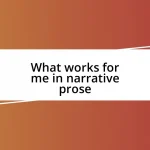Key takeaways:
- Genre fiction serves as a powerful mirror for exploring personal identity, prompting readers to reflect on their own experiences and struggles.
- Character journeys and relationships in fiction can illuminate the complexities of identity, highlighting themes like belonging, self-acceptance, and the influence of cultural backgrounds.
- Authentic representation in writing involves active listening, cultural immersion, and embracing vulnerability, which enhances character depth and storytelling impact.

Understanding genre fiction’s impact
Genre fiction has a unique ability to reflect and shape our understanding of identity. For instance, when I dove into fantasy novels, I found myself constantly questioning who I was in relation to the heroes and anti-heroes that populated those pages. It made me realize how our dreams, struggles, and even our failures contribute to our identity, don’t you think?
I remember reading a sci-fi book that tackled themes of gender fluidity and identity in a way that felt revolutionary to me. It challenged the rigid boundaries I had accepted and invited me to explore the vast spectrum of identity. How often do we find ourselves in stories that push our comfort zones and encourage self-reflection?
In mystery fiction, the unraveling of a character’s true self can serve as a metaphor for our own journeys. I often find that as detectives piece together clues, I’m drawing parallels to my own life, questioning what lies beneath the surface of my identity. Isn’t it fascinating how stories can act as mirrors, showing us parts of ourselves we might not fully understand?
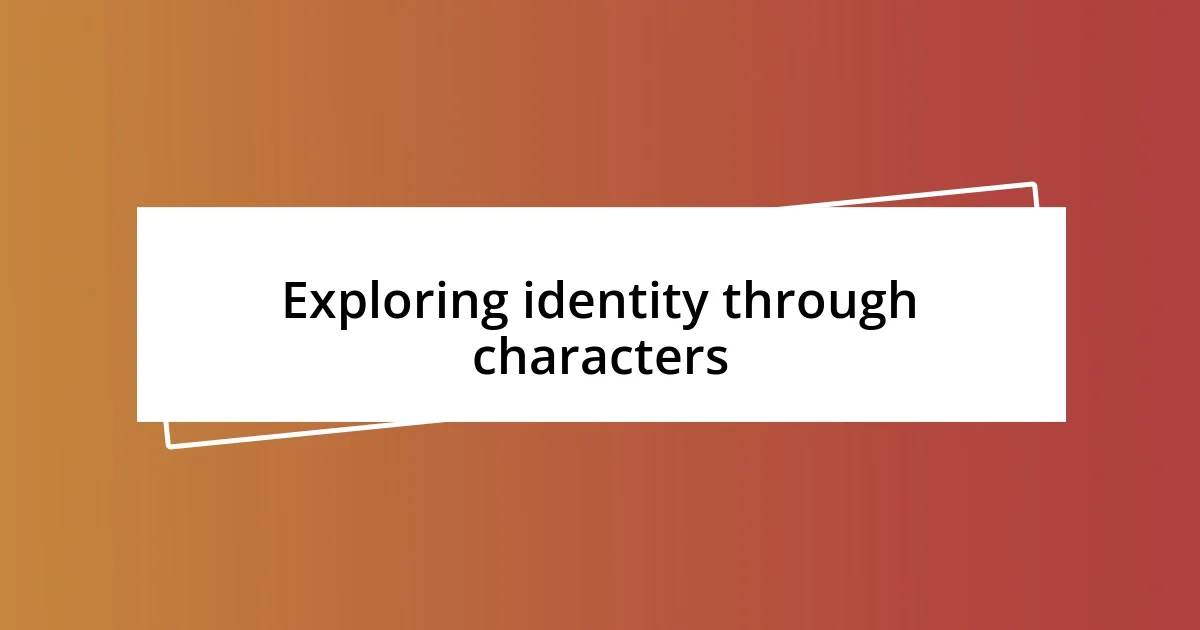
Exploring identity through characters
Characters in genre fiction often serve as reflections of our own identities, helping us explore nuances we may not recognize in ourselves. For example, I remember being captivated by a character who struggled with their cultural identity amid a futuristic society. Their journey resonated with me on a personal level, as I navigated my own feelings of belonging. It made me think: how often do we see ourselves in the characters’ conflicts?
A character’s transformation can vividly illustrate our struggles with self-acceptance. In one fantasy novel, I followed a protagonist who started as an outcast, but through their adventures, slowly embraced their unique abilities. This journey inspired me to reflect on my insecurities and how embracing our individuality can be a heroic act. Have you ever found a character whose growth mirrored your own?
Additionally, exploring relationships between characters can shed light on aspects of our identity too. I recall reading a story where a bond between two friends highlighted themes of loyalty and trust. Their evolving relationship helped me examine my connections with others, prompting me to ask myself: what do my friendships reveal about who I am? This deeper exploration of character dynamics can illuminate not just identity, but also the complexities of human relationships.
| Character Type | Identity Aspect Explored |
|---|---|
| Cultural Outcast | Struggles with belonging |
| Heroic Protagonist | Self-acceptance and growth |
| Friendship Dynamics | Loyalty and identity reflection |
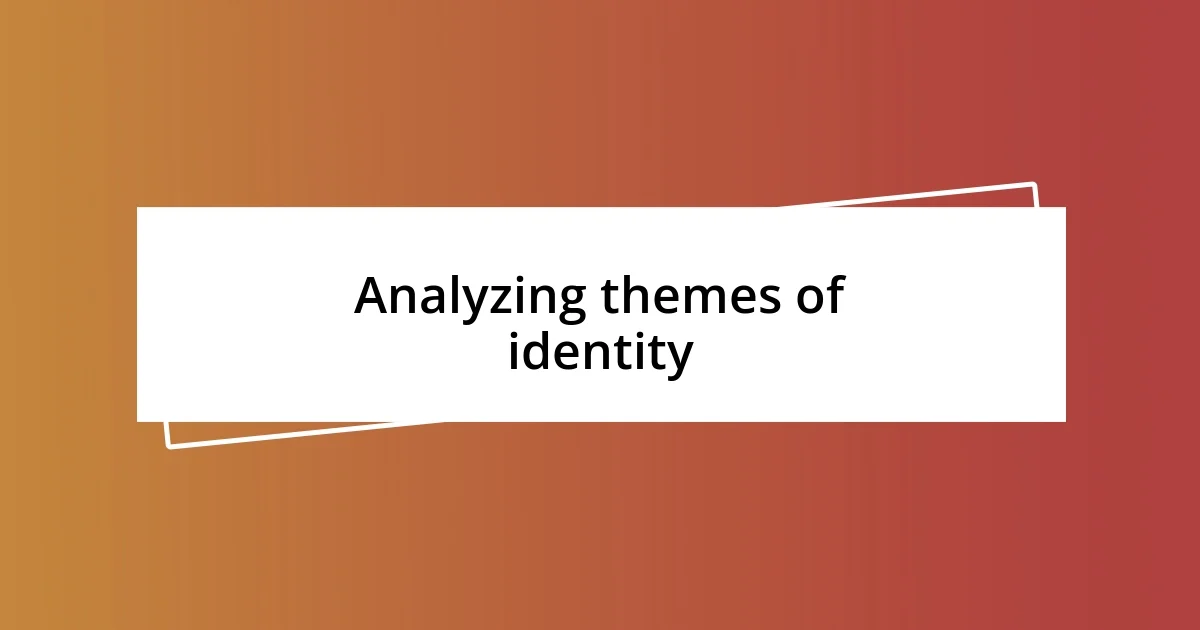
Analyzing themes of identity
Delving into identity themes in genre fiction often reveals the layers we might overlook in our lives. For instance, I once read a dystopian novel where characters grappled with enforced conformity. The emotional weight of their struggle echoed my own fears of losing individuality in a society that often demands uniformity. It’s incredible how these fictional narratives can compel us to confront our true selves, isn’t it?
- Conformity vs. Individuality: Many protagonists fight against societal norms, challenging us to reflect on our own battles.
- Intersectional Identities: Stories that weave together multiple aspects of identity—like race, gender, and class—provide a more nuanced view of the self.
- Personal Growth Through Adversity: Characters overcoming challenges mirror our resilience, showing how adversity can shape who we become.
The exploration of identity often extends beyond the characters themselves into the worlds they inhabit. I felt a deep connection to a fantasy setting once, where each kingdom represented different cultural beliefs. It stirred a sense of curiosity and longing within me—how do our own backgrounds influence our identity? Reflecting on this not only deepened my appreciation for the narrative but also invited me to think about my cultural heritage in a new light.
- Cultural Settings: Different worlds in fiction can highlight how environment shapes identity.
- Moral Dilemmas: When characters face ethical choices, it prompts us to question our own values and beliefs.
- Rebellion as Identity: Stories of rebellion often resonate, making us consider how standing against the norm can define who we are.

Reader’s interpretation of identity
When I read a book and see a character wrestling with their identity, it often draws me into a deeper contemplation of my own experiences. I remember poring over a novel where a shapeshifter navigated their fluid sense of self in a rigid society. That concept struck a chord with me—how many times have I felt constrained by others’ expectations? The text opened a portal for me to explore the multiple facets of who I am.
It’s fascinating how a reader’s background can color their interpretation of identity in genre fiction. I vividly recall reading a science fiction story where the protagonist faced prejudice in a world divided by species. My diverse upbringing made me reflect on my own experiences with acceptance and exclusion. How do my different cultural influences shape the way I perceive these fictional struggles? Each turn of the page felt like peeling layers off my own identity.
Then there are moments when I’ve encountered characters in relationships that mirror my own life. I once connected deeply with a pair of rival artists who ultimately found common ground. Their dynamic made me think: what do my own collaborations reveal about my identity? In that moment, I realized that fiction has a unique power—it’s not just about escaping reality but rather peeling back our own layers through empathy and introspection.
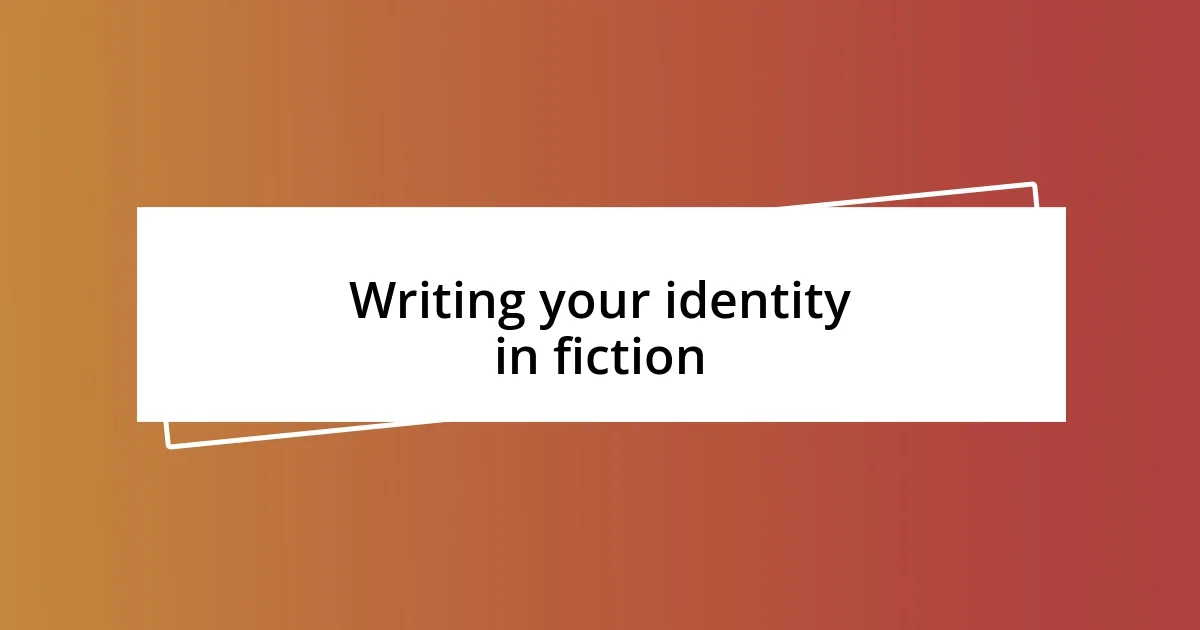
Writing your identity in fiction
Writing your identity in fiction can be an insightful journey. I recall crafting a character based on my love for music—a passion that often feels like an extension of my personality. Through my character, I explored themes of connection and expression, reflecting how music can articulate emotions that words sometimes fail to convey. Have you ever found yourself pouring your own experiences into your writing? It’s as if each note strummed or lyric penned is a bridge to understanding myself better.
I’ve also experimented with incorporating my multicultural background into various narratives. For instance, I created a protagonist who navigated the complex landscapes of two distinct cultures, much like my own journey growing up. This character faced not only outside challenges but also internal conflicts about belonging and identity. Writing these struggles allowed me to process my feelings about being caught between different worlds. How does your unique background shape the characters you bring to life?
Sometimes, I let a character grapple with insecurities that mirror my own. I once wrote a storyline about an artist who feared failure, paralleling my experiences in creative endeavors. That fear can feel all-consuming, can’t it? Watching my character confront and ultimately embrace their fears taught me a lot about resilience and the transformative nature of creativity. Writing fiction isn’t just about creating stories; it’s a pathway to self-discovery and healing.
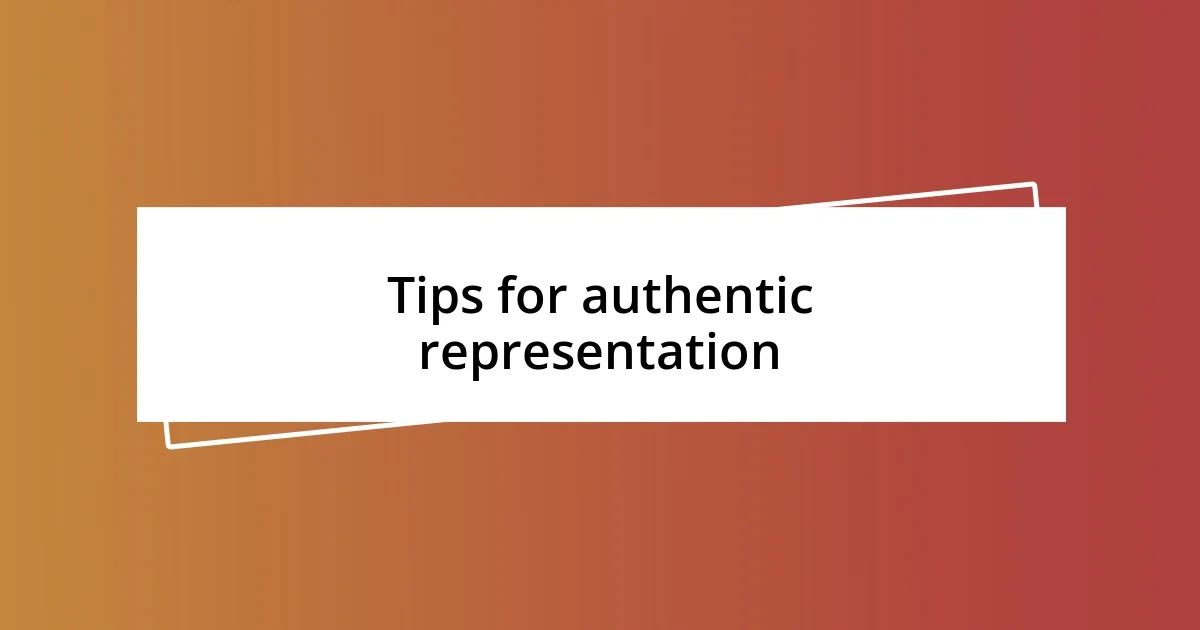
Tips for authentic representation
When it comes to authentic representation, one crucial tip is to engage in active listening. I remember attending a panel discussion about identity in genre fiction. Listening to various speakers share their stories opened my eyes to perspectives I hadn’t considered before. How often do we take the time to really understand experiences that differ from our own? This reflection can enrich our writing and ensure that we approach characters with nuance.
Another important aspect is to research and immerse yourself in the cultures or identities you wish to portray. I once took part in a workshop focused on crafting narratives centered around LGBTQ+ experiences. The depth of knowledge I gained from hearing personal accounts and analyzing relevant literature helped me create a character that resonated with authenticity. Have you ever delved into a subject matter to grasp not just the facts, but the feelings, struggles, and triumphs behind those experiences? Doing so can breathe life into your characters in profound ways.
Lastly, don’t shy away from vulnerability in your writing. There was a time when I hesitated to include my own insecurities in a story, thinking they might detract from the narrative. Yet, sharing that rawness allowed readers to connect with the character on a deeper level. Isn’t it remarkable how breaking down those walls can create a space for empathy? Embracing your own complexities can lead to richer characters and more impactful storytelling.

